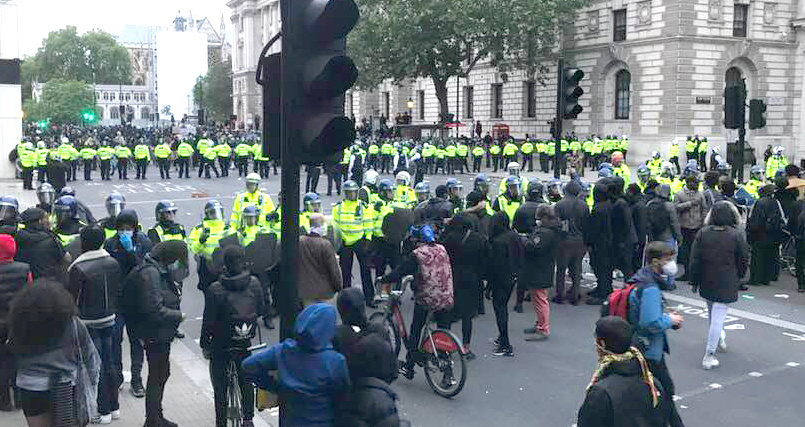
MORE THAN 50 people have been ‘unlawfully arrested’ under the ‘draconian’ Coronavirus Act, it emerged yesterday, yet the government are insisting that the laws remain.
The Tories have reiterated their refusal to repeal the Coronavirus Act, which came into effect in March.
A review by the Crown Prosecution Service (CPS) has revealed that despite some 53 arrests since then, not a single one was lawful.
The creation of ‘unnecessary’ new offences, which have been used against children and vulnerable people, has been strongly condemned by human rights lawyers and campaigners.
In one instance, a woman was fined £660 for a crime she had not committed five days after the Coronavirus Act became law. Charges have so far been withdrawn or overturned for 53 people and more cases are being reviewed.
Yesterday. the director of legal services at the CPS, Gregor McGill, was challenged over why they had not stopped police using the Coronavirus Act, given the 100 per cent rate of unlawful prosecutions.
McGill replied: ‘We can’t tell people not to charge under the act but we’ve issued legal guidance to the lawyers so they understand the precise circumstances where it can be used. It’s not for the CPS to stop charging offences; it’s to make sure that it’s appropriate.’
Documents show that dozens of cases under Schedule 21 of the act are still going through magistrates’ courts across the country.
This gives police forces the power to direct ‘potentially infectious persons’ to a suitable location for screening and assessment, with license to use physical force should they refuse.
Under the act, refusing a direction, escape, or providing false information is a criminal offence punishable by a fine of up to £1,000.
The Coronavirus Act was drafted at a time when it was generally perceived that the threat came from overseas, and dedicated ‘places suitable for screening and assessment’ where infectious people could be detained have never been set up.
A further three sets of laws have since been introduced to enforce the coronavirus lockdown, face masks on public transport and a two-week quarantine for people entering England.
Asked if it would abolish the Coronavirus Act in light of the changes and unlawful prosecutions, the Department of Health also said it would not.
A spokesperson claimed its provisions ‘remain a key part of the UK’s response to Covid-19’ and that schedule 21 is ‘essential to controlling and containing the virus in the long term’.
Kirsty Brimelow QC, a human rights barrister, called for the health secretary to review the powers, saying that they were doing harm by bringing innocent people into court.
‘Firstly we can see from the evidence they’re redundant,’ she said. ‘Secondly, they’re being used unlawfully and thirdly, they’re being used in a way that’s potentially increasing the spread of coronavirus.’
She added: ‘What is the argument for retaining them?’
An official document said people should only be arrested under the Coronavirus Act at the request of a health professional, and that separate laws should be used for people breaking the lockdown.
The Health Protection Regulations, which came into force on 27 March and have been updated as restrictions have eased, gave officers the power to fine or arrest people for being outside ‘without reasonable excuse’ or illegal gatherings.
To date, more than 18,400 fines have been given out by police in England and Wales, although the rate has dropped steeply as the lockdown is relaxed.
Silkie Carlo, director of the Big Brother Watch civil liberties group, said there was a ‘big crossover’ between the laws.
‘Schedule 21 has been used to target and punish vulnerable people – the homeless and mentally ill,’ she added. ‘It contains some of the most extreme powers that parliament has ever passed.
‘There is now no evidence base for them remaining in law, but overwhelming evidence to repeal them.
‘The fact the government is clinging onto them really encapsulates the risk of rapidly creating sweeping emergency laws with no oversight in times like these.’
Carlo said the Coronavirus Act could have a ‘profound impact on human rights,’ following previous warnings from MPs.
She added: ‘If these powers were necessary, they would have been lawful by now, and that hasn’t
happened.’